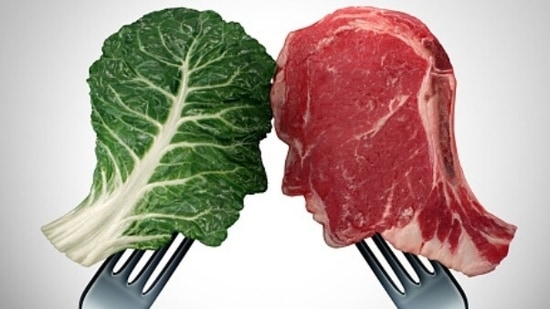The popularity of plant-based meats has skyrocketed in recent years as fitness enthusiasts look for more sustainable and healthy eating options. These foods have the flavor and texture of meat without the use of animal ingredients, but it’s important to weigh the potential health benefits and drawbacks of eating plant-based meats.

Advantages of eating plant-based meat:
In an interview with HT Lifestyle, Dr. Navneet Deora, PhD, Food Products at Bluetribe, shared: “There are several benefits to switching to plant-based meat. It helps regular meat eaters to avoid the problems associated with meat consumption. In India, this is primarily due to the higher incidence of lifestyle-related diseases and the vulnerability of organized meat production to antibiotic and hormone claims, which can cause endocrine disruption and antibiotic resistance. For vegetarians, it helps to reduce their dependence on milk, milk-based products for daily protein. Like milk, paneer is also high in fat, so consumers with high cholesterol or weight may find it difficult to get enough protein if their doctor orders them to cut down/avoid dairy products. Plant-based meat products available from leading companies that are very low in cholesterol compared to meat/dairy-based products have the potential to improve diets for both vegetarians and non-vegetarians, especially those already diagnosed with or exposed to risk of heart disease”.
Adding to her experience, Dr. Sangeeta Tiwari, Clinical Nutritionist at Artemis Hospitals, said: “Plant-based meats have many health benefits and can have a positive effect on cholesterol levels, heart health and overall well-being. These foods, which are often made with ingredients like soy, peas and lentils, are usually lower in saturated fat than their animal-based counterparts. This reduction in saturated fat can help improve cholesterol levels, which is good for heart health. Many plant-based meats are also rich in fiber, which further supports cardiovascular health by helping to lower cholesterol and improve blood pressure. Plant-based meats are generally completely cholesterol-free, which is a significant advantage for those controlling or reducing their risk of heart disease.”

She added: “Having essential nutrients such as vitamins, minerals and antioxidants in plenty of plant-based meats can improve overall well-being. These nutrients play an active role in supporting immune function, promote skin health, and can reduce inflammation. In addition, including plant-based meats in the diet can encourage a varied intake of plant-based proteins, which are often associated with a lower risk of chronic diseases such as type 2 diabetes and some cancers. Since their production is also often less resource-intensive, choosing plant-based meats can have a positive impact on the environment, combined with a sustainable lifestyle. In a nutshell, plant-based meat offers a heart-healthy alternative to traditional meat, supporting lower cholesterol and contributing to a balanced, nutritious diet that promotes long-term well-being.”
Kanika Malhotra, consultant nutritionist and diabetes educator, highlighted the potential health benefits:
● Reduction of saturated fat and cholesterol: Plant-based meats generally contain less saturated fat and cholesterol compared to animal-based meats. It can help lower LDL cholesterol, reducing the risk of heart disease.
● Increase in fiber: Many plant-based meats are loaded with fiber, a nutrient essential for digestive health and weight control. Fiber can help regulate bowel movements, prevent constipation, and promote satiety.
● Reducing environmental impact: Plant-based meat production often has a smaller environmental footprint than animal-based meat, reducing greenhouse gas emissions and water use.
She noted: “Because plant-based meats are lower in cholesterol and saturated fat, eating them can be beneficial for heart health. It is necessary to take into account both the general nutritional value of the product and possible allergies. It is recommended that you include a range of plant-based foods in your diet, such as whole grains, fruits, vegetables and legumes, to get the most benefits. Depending on the brand, ingredients and processing methods, plant-based meat can have different nutritional composition. Some plant-based meats may be higher in saturated fat or salt than others. The context of the whole diet is important.”
Disadvantages of eating plant-based meat:
According to Dr. Navneet Deori, “There are two downsides to be aware of: One is choosing the right product: choose a product from a reputable company, as some companies still make palm oil products that contain trans fats. Another is choosing the right product shape. While there are products like nuggets designed to make it easy for consumers to try plant-based meats, health-conscious people can choose products like plant-based kimchi that are low in salt and cholesterol because their no need to deep-fry.”

Dr. Sangeeta Tiwari revealed, “While plant-based meat has many benefits, it also has some drawbacks. They may be low in essential nutrients such as vitamin B12, iron and omega-3 fatty acids that are commonly found in animal products. Additionally, many plant-based meats are highly processed and may contain additives, preservatives, and artificial ingredients that may not be as healthy as whole foods.”
Kanika Malhotra concluded: “Plant-based meats may be lower in cholesterol and saturated fat, but eating too much or including them in an unhealthy diet can still have a detrimental effect on heart health. While short-term studies have shown the potential benefits of plant-based meats, longer-term studies are needed to fully understand their effects on overall health and well-being.”
Disclaimer: This article is for informational purposes only and is not a substitute for professional medical advice. Always consult your doctor for any health concerns.










